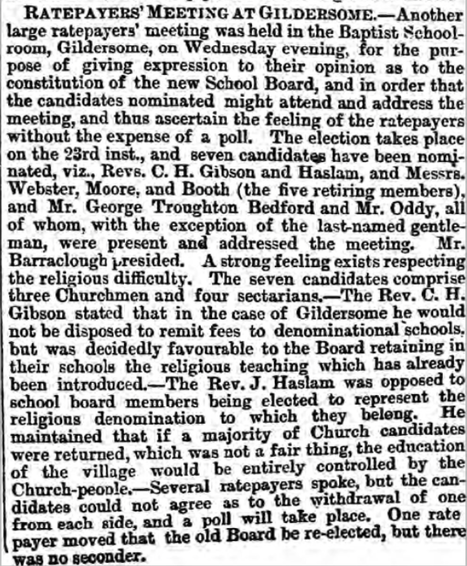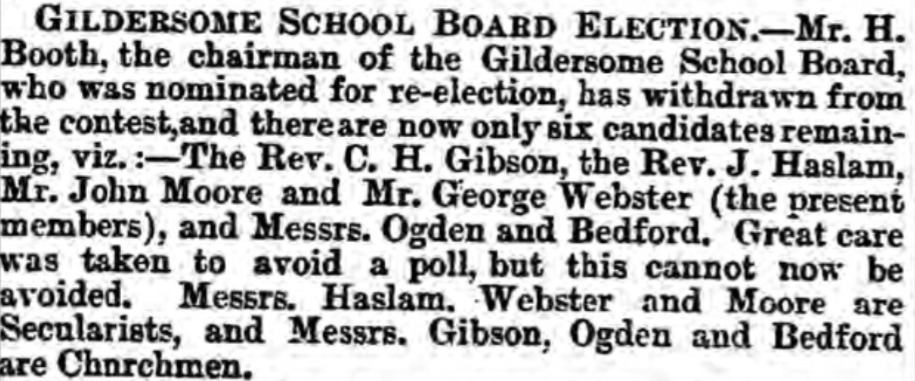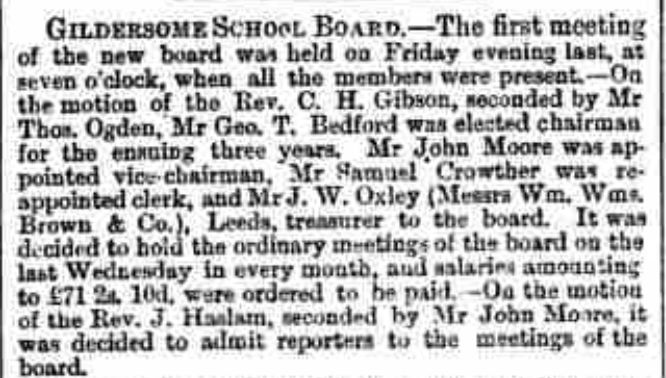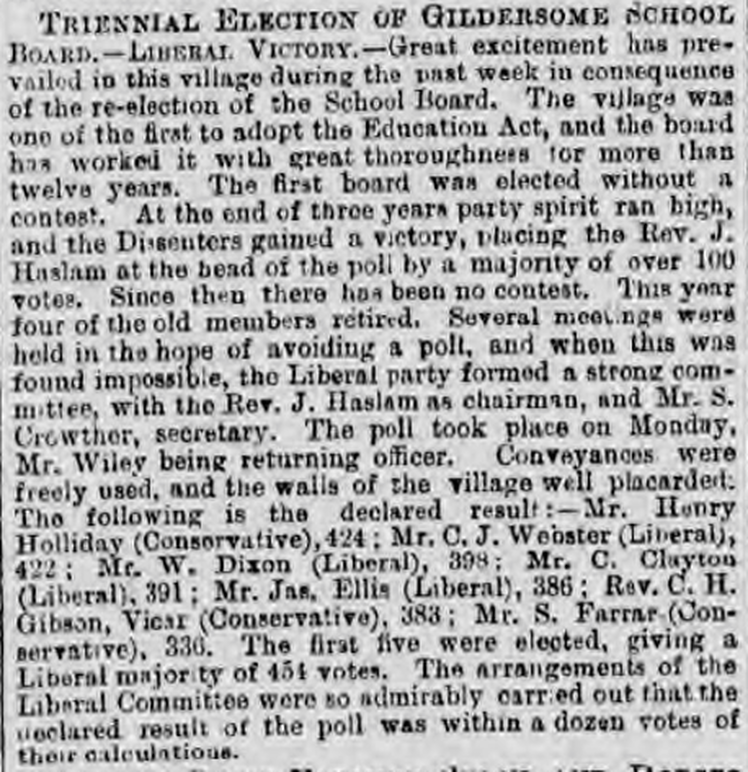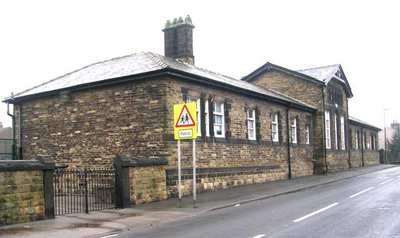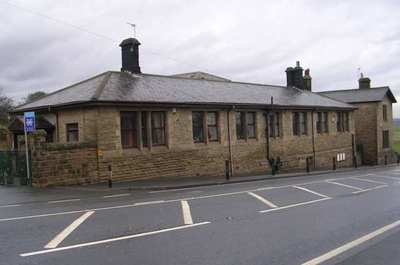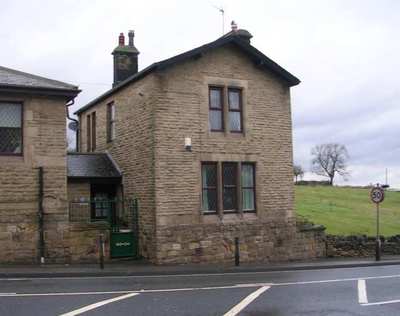Gildersome's Board Schools
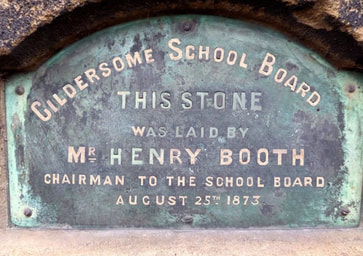 Photo courtesy of "Gildersome, Past, Present & Future" on Facebook
Photo courtesy of "Gildersome, Past, Present & Future" on Facebook
How the Street Lane and Gelderd Road Schools Came to Be.
By the 1860s it became apparent that the education level of England and Wales' general population could not satisfy the demands of the nation's ever increasing technological sophistication, especially in the areas of manufacturing, infrastructure and the military. The nation's poor, and there were plenty of them, received little or no education at all and those that did, had it infused with a heavy dose of religious doctrine. Around the end of the decade, the National Education League¹ was formed to advocate and pressure Parliament for laws requiring compulsory nonsectarian elementary education for all children. The League's pressure was successful due to the fact that plenty of MPs recognized that Britain's competitive edge depended upon an educated workforce. After much debate, the Elementary Education Act 1870¹ was passed. Instead of creating a department for education to administer the change from offices in every county, in its rush for passage, Parliament passed on the responsibilities of its implementation to the local districts in the form of School Boards.
By the 1860s it became apparent that the education level of England and Wales' general population could not satisfy the demands of the nation's ever increasing technological sophistication, especially in the areas of manufacturing, infrastructure and the military. The nation's poor, and there were plenty of them, received little or no education at all and those that did, had it infused with a heavy dose of religious doctrine. Around the end of the decade, the National Education League¹ was formed to advocate and pressure Parliament for laws requiring compulsory nonsectarian elementary education for all children. The League's pressure was successful due to the fact that plenty of MPs recognized that Britain's competitive edge depended upon an educated workforce. After much debate, the Elementary Education Act 1870¹ was passed. Instead of creating a department for education to administer the change from offices in every county, in its rush for passage, Parliament passed on the responsibilities of its implementation to the local districts in the form of School Boards.
|
"School boards were public bodies in England and Wales between 1870 and 1902, which established and administered elementary schools. School boards were created in boroughs and parishes under the Elementary Education Act 1870 following campaigning by George Dixon, Joseph Chamberlain and the National Education League for elementary education free from Anglican doctrine. Education was still not free of fees. Members were directly elected, not appointed by borough councils or parishes. Each board could:
|
The decision empowering local school boards to discharge the Act's objectives sometimes led to bitter debate, partly over rate paying but for the most part over the issue of religion, or lack thereof, in the curriculum. Religious leaders, especially the established Church, saw it as a loss of control over the hearts and minds of their adherents. While those of other faiths or factions feared that school boards could become packed with Church supporters and their children would be forced into church schools while they foot the bill.
Not to be outdone, Gildersome was on the cutting edge of the secular issue and its voice was much louder than its size. With Anglicans, Quakers, Baptists, Wesleyans and Methodists, all tightly packed in a population of 3400, it was a melting pot of of ideas which tended to breed an atmosphere of tolerance and progressive thought. Many of Gildersome's religious leaders and prominent citizens attended meetings and debates throughout West Yorkshire. Reverend John Haslam, Baptist minister and headmaster of Gildersome's Turton Hall Academy, was a very well known and popular speaker, he became one of the most vocal proponent of secularism, some of his arguments are presented below. In a vote taken at a meeting of ratepayers in Gildersome, a petition was approved and subsequently sent to the House of Commons protesting against the religious clauses in the Bill. And, in February 1871, Gildersome voted to adopt a School Board, making it one of the first districts in England to do so. (See the newspaper articles below)
When it came to compliance with the provisions of the Bill, Gildersome seemed better off than many other districts. It already contained the following schools which, when fully attended, provided space for approximately 700 students, they were: Mr. Lister's school, the Church or National school, the British or Baptist school, Mr. John Naylor's school and the free school at Mill Lane and the Green. A survey taken at the time found 1,687 children, 742 were between the age three and thirteen. When it came to paying the extra rates (taxes), Mr. Francis Booth, speaking at town meeting in Feb 1871 said: "that the valuation of the township was £8,000, that there were about 800 ratepayers, that fewer than twenty of them pay three-fourths of the rates, and that supposing the school rates were to amount to £l00, there would be something like 8d. each required from the great body the ratepayers to make up one-fourth that sum." ²
The following newspaper article, in which a large portion includes a meeting in Gildersome, appeared in the Bradford Observer on 9 Mar 1870 under the title "The Education Question". It was chosen because it presents a representative snapshot of some of the discussions and attitudes prevailing at the time.³
Not to be outdone, Gildersome was on the cutting edge of the secular issue and its voice was much louder than its size. With Anglicans, Quakers, Baptists, Wesleyans and Methodists, all tightly packed in a population of 3400, it was a melting pot of of ideas which tended to breed an atmosphere of tolerance and progressive thought. Many of Gildersome's religious leaders and prominent citizens attended meetings and debates throughout West Yorkshire. Reverend John Haslam, Baptist minister and headmaster of Gildersome's Turton Hall Academy, was a very well known and popular speaker, he became one of the most vocal proponent of secularism, some of his arguments are presented below. In a vote taken at a meeting of ratepayers in Gildersome, a petition was approved and subsequently sent to the House of Commons protesting against the religious clauses in the Bill. And, in February 1871, Gildersome voted to adopt a School Board, making it one of the first districts in England to do so. (See the newspaper articles below)
When it came to compliance with the provisions of the Bill, Gildersome seemed better off than many other districts. It already contained the following schools which, when fully attended, provided space for approximately 700 students, they were: Mr. Lister's school, the Church or National school, the British or Baptist school, Mr. John Naylor's school and the free school at Mill Lane and the Green. A survey taken at the time found 1,687 children, 742 were between the age three and thirteen. When it came to paying the extra rates (taxes), Mr. Francis Booth, speaking at town meeting in Feb 1871 said: "that the valuation of the township was £8,000, that there were about 800 ratepayers, that fewer than twenty of them pay three-fourths of the rates, and that supposing the school rates were to amount to £l00, there would be something like 8d. each required from the great body the ratepayers to make up one-fourth that sum." ²
The following newspaper article, in which a large portion includes a meeting in Gildersome, appeared in the Bradford Observer on 9 Mar 1870 under the title "The Education Question". It was chosen because it presents a representative snapshot of some of the discussions and attitudes prevailing at the time.³
THE EDUCATION QUESTION
A meeting at Birkenhead has resolved a petition in favour of the bill, trusting to the wisdom of Parliament to amend the objectionable clauses. At a meeting of the Birmingham Town Council, yesterday, a resolution in favour of the amendments in the the Government Education Bill advocated by the National Education League was passed.—A large meeting at Plymouth has passed resolutions embodying the objections of the National Education League to the Government bill.
Leeds and the Education Bill. The deputation selected from the Leeds branch of the Education League to wait upon Mr. Gladstone, Earl de Grey, and Mr. W. E. Forster, are—the Mayor, Alderman Barran, Mr. William Crowther, Mr. Joseph Lupton, and Mr. T. R. Clarke. The trade societies of Leeds are nearly unanimous in petitioning against the clauses of the Education Bill to which the League object. Already the petition has been signed on behalf of the following societies — Lodge of the Operative Masons, representing 269 members; South Branch of Amalgamated Engineers, 274; Friendly Boiler Makers and Iron Shipbuilders, 100; United File Smiths, 54; Hatters’ Society, 23 ; Operative Millers, Lodge No. 4, 20; First Branch, Amalgamated Carpenters and Joiners, 180 ; United Coach Makers, 150 ; Loyal Vulcan Lodge of Smiths, 111 ; Operative Carpenters and Joiners. 107; Leeds Plasterers’ Labourers, 70. These represent a total of 1357 of the best workmen of Leeds; and other societies are daily giving in their signatures to the petition. Mr. Edwin Chadwick has read a paper on the education question before the Social Science Association. Mr. Chadwick is no admirer of the principle of giving such great powers to local bodies. Before compulsory education is adopted, he argues that there must be a complete system of machinery arranged in order to carry it into effect. Plenty of school accommodation must be provided, and a higher standard of attainment ought to adopted for the future. These ends, Mr. Chadwick thinks, will never be attained by vestries and town councils. He prefers that the matter should be entrusted to a new body — one-third to be nominated by the Department of Education, on the principle of the metropolitan district boards; one-third to be elected representatives of ratepayers, with a fair property qualification, like special jurors; and a third nominated by the supporters of the existing schools; the religious difficulty to be left for adjustment by the Government, as it is in Holland and is in Germany. Nevertheless, he thinks the great principle of the Government bill so important that it had better be passed at all hazards than fail.
The Bishop of Ely on the Bill.— At a conference of clergy and laity held at Bedford on Monday, under the presidency of the Lord Bishop of Ely, his lordship expressed strongly his conviction that education, in order to be a blessing to the country, must be founded upon religion. If he had to choose between bringing his own children under mere secular influence or having them instructed by a Dissenting minister, he would incomparably sooner adopt the latter alternative (cheers). The poor had for the last fifty years come to rely so much upon schools for all kinds of instruction that they scarcely attempted to supply any deficiencies themselves; and were religious principles now withdrawn from the school training, the great probability was that the children of the poor would be likely to get religious education nowhere. On the whole, the bill seemed to be satisfactory, although there were details which it would be desirable to have modified. His lordship referred briefly to three points—the conscience clause, the rating, and the compulsory provisions—as subjects for discussion, and expressed fear lest rating may injure voluntary efforts. He trusted the bill would meet the demands of the nation, although it might undergo some modifications in matters of detail. Resolutions, expressing a general approval of the bill, were carried.
Objections to the Government Education Bill at Liverpool.— Mr. Forster’s Educational Bill was severely handled at Liverpool, yesterday, by the U. P. Presbytery, at their annual meeting, and by conference of Protestant Nonconformists, held the Law Association Rooms. The former body resolved to petition the House of Commons to amend various clauses, which, if passed unamended, will seriously interfere with the religious liberties of the people; while at the conference Mr. J. J. Stett, who was in the chair, argued that the clauses relating to religious instruction were calculated to shirk and not meet difficulties, to settle nothing and unsettle everything, and even to revive religious animosities. The special committee of the Liverpool Town Council appointed to consider Mr. Forsters bill, advise the Council to report only on the financial burdens cast on the ratepayers and the position of the Corporation schools affected by the bill. This report will be discussed at a special meeting of the Council next Saturday.
Meeting on the Education Question at Gildersome.— A public meeting was held in the Baptist Schoolroom, on Monday evening, to discuss the Government Education Bill. There was a very large attendance of working men. Mr. Moore (manufacturer), was voted to the chair, and called upon the Rev. J. Haslam to introduce the subject. Mr. Haslam gave an outline of the Government measure, and said that the two most objectional elements in the bill were the permissive character of the so-called compulsory clause, and the religious question. In both cases the Government had shifted the difficulty from their shoulders to the shoulders of others, instead of grappling with it, and framing an imperial measure for the nation such (hear hear). He objected strongly to the Government sanctioning the denominational system, which simply meant Church of Englandism. The bill was framed to conciliate the clergy, and would have been a very different measure were it not for the State Church ascendancy (applause). The bill enabled them to dispense with private subscriptions, and to compel the ratepayers to find the money; so that men might be taxed and taught Judaism, Roman Catholicism, Ritualism, or any other ‘ism’. Compared with this monstrous injustice church-rates were nothing, and for himself he would never pay a penny for such a rate (applause). The conscience clause was sham. It would be evaded where most needed. What they demanded as Nonconformists was a national system of education supported by the rates, not permission to withdraw their children from denominational teaching, which would make them speckled birds, but perfect equality (applause). The present denominational system was not satisfactory. Many of the youths trained under it were “well up" in Old Testament history, but knew nothing of English history and geography. They could tell a great deal more about the wars of the Jews than the wars of the Roses, and the Jordan than the Shannon or the Tweed. This was not what the country wanted. We wanted better education for the masses—an education in secular knowledge in which all could agree, and leave the “sects” to supplement it. To call this a godless education was ecclesiastical cant. Mr. Haslam concluded by moving: ‘That, in the opinion of this meeting, the Government Education Bill is eminently unsatisfactory; and this meeting protests against the proposals which give local boards unrestricted power to determine the religious character of the schools to be supported and aided by rates. This enables the majority in every district to tax the minority for teaching the religion of the majority. It establishes a new form of church rates, and is practically the adoption of the irreligions principle of concurrent endowments, and must lead to the violation of the consciences of many, and give birth to strifes and divisions which will be most injurious to the social harmony and spiritual welfare of the country. Further, all rate-aided school teaching must be actually unsectarian, and all schools aided by the Government grants all denominational teaching should be at separate hours’ —Mr. L. Booth (a working man) seconded the motion. He disliked the bill because it gave Church parsons the control of the education of the people. He quoted from a speech made by the Dean of Durham to this effect. He contended that the conscience clause would be practically useless. He thought that national education should be secular and free, and quoted from the Financial Reformer statistics which showed that the greater part of the money spent in education was not spent on the poor (applause).—Mr. J. H. Bennett, in very elaborate speech, moved the formation of a branch of the Education League at Gildersome.—This was seconded Mr G. Richardson.—Mr. S. Hall moved the officers and committee, which was seconded by Mr. Wm Bilbrough - The Rev. J. Haslam then submitted a petition to Parliament, and moved that it be signed by the chairman and forwarded to Mr. Carter.—This was seconded by Mr Wm. Lister, and supported by Mr. G. Webster and Mr. H. Booth, and was carried, with one dissentient. --
We are informed that many persons have joined the League, and that it is proposed to hold other meetings in the district.”
A meeting at Birkenhead has resolved a petition in favour of the bill, trusting to the wisdom of Parliament to amend the objectionable clauses. At a meeting of the Birmingham Town Council, yesterday, a resolution in favour of the amendments in the the Government Education Bill advocated by the National Education League was passed.—A large meeting at Plymouth has passed resolutions embodying the objections of the National Education League to the Government bill.
Leeds and the Education Bill. The deputation selected from the Leeds branch of the Education League to wait upon Mr. Gladstone, Earl de Grey, and Mr. W. E. Forster, are—the Mayor, Alderman Barran, Mr. William Crowther, Mr. Joseph Lupton, and Mr. T. R. Clarke. The trade societies of Leeds are nearly unanimous in petitioning against the clauses of the Education Bill to which the League object. Already the petition has been signed on behalf of the following societies — Lodge of the Operative Masons, representing 269 members; South Branch of Amalgamated Engineers, 274; Friendly Boiler Makers and Iron Shipbuilders, 100; United File Smiths, 54; Hatters’ Society, 23 ; Operative Millers, Lodge No. 4, 20; First Branch, Amalgamated Carpenters and Joiners, 180 ; United Coach Makers, 150 ; Loyal Vulcan Lodge of Smiths, 111 ; Operative Carpenters and Joiners. 107; Leeds Plasterers’ Labourers, 70. These represent a total of 1357 of the best workmen of Leeds; and other societies are daily giving in their signatures to the petition. Mr. Edwin Chadwick has read a paper on the education question before the Social Science Association. Mr. Chadwick is no admirer of the principle of giving such great powers to local bodies. Before compulsory education is adopted, he argues that there must be a complete system of machinery arranged in order to carry it into effect. Plenty of school accommodation must be provided, and a higher standard of attainment ought to adopted for the future. These ends, Mr. Chadwick thinks, will never be attained by vestries and town councils. He prefers that the matter should be entrusted to a new body — one-third to be nominated by the Department of Education, on the principle of the metropolitan district boards; one-third to be elected representatives of ratepayers, with a fair property qualification, like special jurors; and a third nominated by the supporters of the existing schools; the religious difficulty to be left for adjustment by the Government, as it is in Holland and is in Germany. Nevertheless, he thinks the great principle of the Government bill so important that it had better be passed at all hazards than fail.
The Bishop of Ely on the Bill.— At a conference of clergy and laity held at Bedford on Monday, under the presidency of the Lord Bishop of Ely, his lordship expressed strongly his conviction that education, in order to be a blessing to the country, must be founded upon religion. If he had to choose between bringing his own children under mere secular influence or having them instructed by a Dissenting minister, he would incomparably sooner adopt the latter alternative (cheers). The poor had for the last fifty years come to rely so much upon schools for all kinds of instruction that they scarcely attempted to supply any deficiencies themselves; and were religious principles now withdrawn from the school training, the great probability was that the children of the poor would be likely to get religious education nowhere. On the whole, the bill seemed to be satisfactory, although there were details which it would be desirable to have modified. His lordship referred briefly to three points—the conscience clause, the rating, and the compulsory provisions—as subjects for discussion, and expressed fear lest rating may injure voluntary efforts. He trusted the bill would meet the demands of the nation, although it might undergo some modifications in matters of detail. Resolutions, expressing a general approval of the bill, were carried.
Objections to the Government Education Bill at Liverpool.— Mr. Forster’s Educational Bill was severely handled at Liverpool, yesterday, by the U. P. Presbytery, at their annual meeting, and by conference of Protestant Nonconformists, held the Law Association Rooms. The former body resolved to petition the House of Commons to amend various clauses, which, if passed unamended, will seriously interfere with the religious liberties of the people; while at the conference Mr. J. J. Stett, who was in the chair, argued that the clauses relating to religious instruction were calculated to shirk and not meet difficulties, to settle nothing and unsettle everything, and even to revive religious animosities. The special committee of the Liverpool Town Council appointed to consider Mr. Forsters bill, advise the Council to report only on the financial burdens cast on the ratepayers and the position of the Corporation schools affected by the bill. This report will be discussed at a special meeting of the Council next Saturday.
Meeting on the Education Question at Gildersome.— A public meeting was held in the Baptist Schoolroom, on Monday evening, to discuss the Government Education Bill. There was a very large attendance of working men. Mr. Moore (manufacturer), was voted to the chair, and called upon the Rev. J. Haslam to introduce the subject. Mr. Haslam gave an outline of the Government measure, and said that the two most objectional elements in the bill were the permissive character of the so-called compulsory clause, and the religious question. In both cases the Government had shifted the difficulty from their shoulders to the shoulders of others, instead of grappling with it, and framing an imperial measure for the nation such (hear hear). He objected strongly to the Government sanctioning the denominational system, which simply meant Church of Englandism. The bill was framed to conciliate the clergy, and would have been a very different measure were it not for the State Church ascendancy (applause). The bill enabled them to dispense with private subscriptions, and to compel the ratepayers to find the money; so that men might be taxed and taught Judaism, Roman Catholicism, Ritualism, or any other ‘ism’. Compared with this monstrous injustice church-rates were nothing, and for himself he would never pay a penny for such a rate (applause). The conscience clause was sham. It would be evaded where most needed. What they demanded as Nonconformists was a national system of education supported by the rates, not permission to withdraw their children from denominational teaching, which would make them speckled birds, but perfect equality (applause). The present denominational system was not satisfactory. Many of the youths trained under it were “well up" in Old Testament history, but knew nothing of English history and geography. They could tell a great deal more about the wars of the Jews than the wars of the Roses, and the Jordan than the Shannon or the Tweed. This was not what the country wanted. We wanted better education for the masses—an education in secular knowledge in which all could agree, and leave the “sects” to supplement it. To call this a godless education was ecclesiastical cant. Mr. Haslam concluded by moving: ‘That, in the opinion of this meeting, the Government Education Bill is eminently unsatisfactory; and this meeting protests against the proposals which give local boards unrestricted power to determine the religious character of the schools to be supported and aided by rates. This enables the majority in every district to tax the minority for teaching the religion of the majority. It establishes a new form of church rates, and is practically the adoption of the irreligions principle of concurrent endowments, and must lead to the violation of the consciences of many, and give birth to strifes and divisions which will be most injurious to the social harmony and spiritual welfare of the country. Further, all rate-aided school teaching must be actually unsectarian, and all schools aided by the Government grants all denominational teaching should be at separate hours’ —Mr. L. Booth (a working man) seconded the motion. He disliked the bill because it gave Church parsons the control of the education of the people. He quoted from a speech made by the Dean of Durham to this effect. He contended that the conscience clause would be practically useless. He thought that national education should be secular and free, and quoted from the Financial Reformer statistics which showed that the greater part of the money spent in education was not spent on the poor (applause).—Mr. J. H. Bennett, in very elaborate speech, moved the formation of a branch of the Education League at Gildersome.—This was seconded Mr G. Richardson.—Mr. S. Hall moved the officers and committee, which was seconded by Mr. Wm Bilbrough - The Rev. J. Haslam then submitted a petition to Parliament, and moved that it be signed by the chairman and forwarded to Mr. Carter.—This was seconded by Mr Wm. Lister, and supported by Mr. G. Webster and Mr. H. Booth, and was carried, with one dissentient. --
We are informed that many persons have joined the League, and that it is proposed to hold other meetings in the district.”
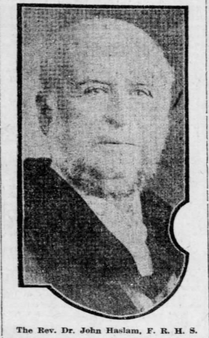 Rev. John Haslam
Rev. John Haslam
The Education Act became law in August of 1870. Gildersome's citizens couldn't wait to get in on the act (pun intended) by approving their own School Board by February of the next year, well before most districts in the country. The following is a description of that decisive meeting as reported in the Leeds Mercury, 25 Feb 1871: ³
“Decision in Favor of a School Board at Gildersome. — ln compliance with a numerously-signed requisition, a meeting the ratepayers of the township Gildersome, convened by Mr. Dolby, clerk to the Bramley Union, of which the township forms a part, was held last evening in the Church school-room, to decide upon the expediency of having a School Board. Mr. John Moore was called to the chair, and there was a good attendance. —Mr. Dolby, having read the notice convening the meeting, the Chairman offered a few preliminary remarks, the course of which he stated that it was quite necessary to have a School Board. —Mr. Jas. Dixon moved “That, in the opinion of this meeting it is expedient that the Elementary Education Act 1870 should be adopted, and a School Board formed for the township of Gildersome." He generally urged the advantages of having a School Board, and thought that they might, by agreeing among themselves, secure the existing schools in the village on condition of paying a very small rental.—Mr. S. Whitley seconded the motion, and contended that, if the ratepayers studied their own interests, they would support the proposal. The rates could not be very large, and any opposition to the Act on pecuniary grounds was of paltry character.—The Rev. C. H. Gibson, incumbent of Gildersome, intimated, as a manager of the Church school, that so far as he saw at present, it would not be placed under the control of the Board. He might, however, see reason to change his mind.—The Chairman said that he and Mr. Richardson, the overseer, had been at some trouble in obtaining statistics as to the requirements of Gildersome. They had gone through all the schools in one day, which unfortunately happened to one that was said to be the worst they could nave chosen, because so many were absent, and especially girls, engaged in household duties. At the various schools they had found a total of 397 in attendance, and 520 on the books. They had also endeavoured to ascertain the number of children under 13 years of age and above 3, eligible for attendance school, and in one district visited, with 118 houses, they had found there were 207 children under thirteen, 128 of whom were over three years of age. For 38 of the houses there were no children. From this investigation they concluded that there were 900 children in Gildersome of fit age to go to school, and he considered that they were under the mark. If Mr. Lister's school, the Church school, the British or Baptist school, Mr. J. Naylor's school, and the Free Church school, were all occupied they would hold 700 children, and making use of all the accommodation that might be procured he calculated that there was sufficient or nearly sufficient accommodation for all. Some schools might not be placed under the control of the Board, but that would not matter, supposing they were fully attended. (Hear, hear, and applause.)— Mr. J. Lister stated that he had got statistics from 660 families in Gildersome, and he found that there were 2,942 inhabitants, of whom 1,687 were children. 742 were between the age three and thirteen, and were in attendance at school. He had understood from some one at a former meeting that there were 800 ratepayers in Gildersome, but he thought he should have a difficulty in finding so many. A few houses were omitted from his return, but not many, and he thought the state of education in Gildersome was such that he did not think the inhabitants need be in any particular hurry to have a School Board formed. He argued that in some few cases the operation of the Act would prove a hardship, and he thought modification in some points might desirable. Being favourable to delay until it was seen how the Act worked elsewhere, he moved as an amendment that the meeting stand adjourned for six months. —The Rev. J. S. Haslem said the amendment could not be accepted, as they must decide there and then, and if they did not adopt the Act they could not take action until twelve months had elapsed.—The resolution was afterwards supported by Mr. W. Lister, the Rev. J. S. Haslem, Mr. J. Clarke, and Mr. F. Booth. Mr. Haslem enforced energetically the desirableness of having education carried on by a School Board, compelling all to bear their proper share of the cost, in preference to the present system, which he maintained to be unsound in basis. Mr. F. Booth mentioned that the valuation of the township was £8,000, that there were about 800 ratepayers, that fewer than twenty of them pay three-fourths of the rates, and that supposing the school rates were to amount to £l00, there would be something like 8d. each required from the great body the ratepayers to make up one-fourth that sum.— On being put to the meeting the resolution was carried with only one dissentient. No poll was demanded, and the proceedings were at once brought to conclusion with formal votes of thanks”
“Decision in Favor of a School Board at Gildersome. — ln compliance with a numerously-signed requisition, a meeting the ratepayers of the township Gildersome, convened by Mr. Dolby, clerk to the Bramley Union, of which the township forms a part, was held last evening in the Church school-room, to decide upon the expediency of having a School Board. Mr. John Moore was called to the chair, and there was a good attendance. —Mr. Dolby, having read the notice convening the meeting, the Chairman offered a few preliminary remarks, the course of which he stated that it was quite necessary to have a School Board. —Mr. Jas. Dixon moved “That, in the opinion of this meeting it is expedient that the Elementary Education Act 1870 should be adopted, and a School Board formed for the township of Gildersome." He generally urged the advantages of having a School Board, and thought that they might, by agreeing among themselves, secure the existing schools in the village on condition of paying a very small rental.—Mr. S. Whitley seconded the motion, and contended that, if the ratepayers studied their own interests, they would support the proposal. The rates could not be very large, and any opposition to the Act on pecuniary grounds was of paltry character.—The Rev. C. H. Gibson, incumbent of Gildersome, intimated, as a manager of the Church school, that so far as he saw at present, it would not be placed under the control of the Board. He might, however, see reason to change his mind.—The Chairman said that he and Mr. Richardson, the overseer, had been at some trouble in obtaining statistics as to the requirements of Gildersome. They had gone through all the schools in one day, which unfortunately happened to one that was said to be the worst they could nave chosen, because so many were absent, and especially girls, engaged in household duties. At the various schools they had found a total of 397 in attendance, and 520 on the books. They had also endeavoured to ascertain the number of children under 13 years of age and above 3, eligible for attendance school, and in one district visited, with 118 houses, they had found there were 207 children under thirteen, 128 of whom were over three years of age. For 38 of the houses there were no children. From this investigation they concluded that there were 900 children in Gildersome of fit age to go to school, and he considered that they were under the mark. If Mr. Lister's school, the Church school, the British or Baptist school, Mr. J. Naylor's school, and the Free Church school, were all occupied they would hold 700 children, and making use of all the accommodation that might be procured he calculated that there was sufficient or nearly sufficient accommodation for all. Some schools might not be placed under the control of the Board, but that would not matter, supposing they were fully attended. (Hear, hear, and applause.)— Mr. J. Lister stated that he had got statistics from 660 families in Gildersome, and he found that there were 2,942 inhabitants, of whom 1,687 were children. 742 were between the age three and thirteen, and were in attendance at school. He had understood from some one at a former meeting that there were 800 ratepayers in Gildersome, but he thought he should have a difficulty in finding so many. A few houses were omitted from his return, but not many, and he thought the state of education in Gildersome was such that he did not think the inhabitants need be in any particular hurry to have a School Board formed. He argued that in some few cases the operation of the Act would prove a hardship, and he thought modification in some points might desirable. Being favourable to delay until it was seen how the Act worked elsewhere, he moved as an amendment that the meeting stand adjourned for six months. —The Rev. J. S. Haslem said the amendment could not be accepted, as they must decide there and then, and if they did not adopt the Act they could not take action until twelve months had elapsed.—The resolution was afterwards supported by Mr. W. Lister, the Rev. J. S. Haslem, Mr. J. Clarke, and Mr. F. Booth. Mr. Haslem enforced energetically the desirableness of having education carried on by a School Board, compelling all to bear their proper share of the cost, in preference to the present system, which he maintained to be unsound in basis. Mr. F. Booth mentioned that the valuation of the township was £8,000, that there were about 800 ratepayers, that fewer than twenty of them pay three-fourths of the rates, and that supposing the school rates were to amount to £l00, there would be something like 8d. each required from the great body the ratepayers to make up one-fourth that sum.— On being put to the meeting the resolution was carried with only one dissentient. No poll was demanded, and the proceedings were at once brought to conclusion with formal votes of thanks”
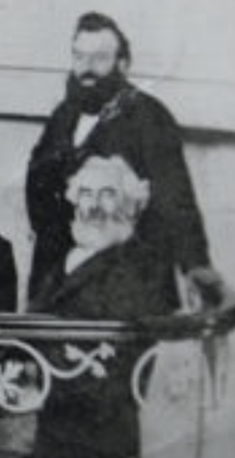 Geo Webster top, Henry Booth below.
Geo Webster top, Henry Booth below.
In a meeting the next month, the first first order of business was to elect members of the new Board, they were: Rev. C. H. Gibson (Vicar), Rev J. Haslam (Baptist), and Messrs, George Webster and H. Booth (Baptists) and John Moore (United Mrthodist Free Church). ⁴
For some reason, local newspaper coverage of the Gildersome School Board ends in March of 1871, with the election of the new Board above, and doesn't resume until November of 1872. This is unfortunate because most of the big decisions were made during this period. By reviewing the results of those decisions and by using bits of information from other sources, it's possible to infer what took place.
It's clear from summation of the Feb 25 meeting above, that the new School Board was entering uncharted waters. At first it was believed that the student population would occupy space that was already used for schooling but in the end that proved impractical. Eventually, the decision was made to construct two new schools built on purchased or donated land, one on Street Lane and the other on Gelderd Road. Any costs arising from land purchases and construction of the two new schools would come from the Public Works Loan Commissioners as specified in the Education Act. A third temporary school, which was called the Moor Head school, was planned for use until the completion of the new schools, it would utilize an existing building. I presume it was held in an existing building at or near Moor Head Mill and that it was either leased from or donated rent free by Board chairman Henry Booth, who owned Moor Head Mill at that time. The Act also permitted School Boards to create their own byelaws which gave the Board some degree of latitude in determining the specifics of school operations, such as absenteeism, religious issues, rates, etc. Below are the Byelaws that were approved by the Board in October 1873 and subsequently delivered to the Board of Education for their consent. Changes could be made (and were) to the Byelaws as the Board deemed necessary, and any such amendments would be forwarded to the Board of Education for approval.
For some reason, local newspaper coverage of the Gildersome School Board ends in March of 1871, with the election of the new Board above, and doesn't resume until November of 1872. This is unfortunate because most of the big decisions were made during this period. By reviewing the results of those decisions and by using bits of information from other sources, it's possible to infer what took place.
It's clear from summation of the Feb 25 meeting above, that the new School Board was entering uncharted waters. At first it was believed that the student population would occupy space that was already used for schooling but in the end that proved impractical. Eventually, the decision was made to construct two new schools built on purchased or donated land, one on Street Lane and the other on Gelderd Road. Any costs arising from land purchases and construction of the two new schools would come from the Public Works Loan Commissioners as specified in the Education Act. A third temporary school, which was called the Moor Head school, was planned for use until the completion of the new schools, it would utilize an existing building. I presume it was held in an existing building at or near Moor Head Mill and that it was either leased from or donated rent free by Board chairman Henry Booth, who owned Moor Head Mill at that time. The Act also permitted School Boards to create their own byelaws which gave the Board some degree of latitude in determining the specifics of school operations, such as absenteeism, religious issues, rates, etc. Below are the Byelaws that were approved by the Board in October 1873 and subsequently delivered to the Board of Education for their consent. Changes could be made (and were) to the Byelaws as the Board deemed necessary, and any such amendments would be forwarded to the Board of Education for approval.
THE ELEMENTARY EDUCATION ACT, 1870.
BYELAWS of THE GILDERSOME SCHOOL BOARD. ⁵
BYELAWS of THE GILDERSOME SCHOOL BOARD. ⁵
|
Whereas, in pursuance of a requisition sent by the Education Department to the returning officer for the parish of Gildersome, in the county of York, a school board for the district of the said parish was duly reelected on the 29th day of March 1871. Now, at a meeting of the school board of the said parish of Gildersome, duly convened and held at the board-room at the Working Men’s Club, in the said parish of Gildersome, on Wednesday, the 15th of October 1873, at which meeting a quorum of the members of such board are present, the said board do hereby, in pursuance of the aforesaid powers, and subject to the approval of the Education Department, make and ordain the following byelaws
Definition of Terms. In the following byelaws- The term “ Education Department ” means the Lords of the Committee of Privy Council on Education. ‘ The term “ Her Majesty’s Inspectors ” means the Inspectors of schools appointed by Her Majesty on the recommendation of the Education Department. The term “ school board ” or “ board” means the school board of the district comprising the parish of Gildersome. Terms importing males include females. The term “ public elementary school” means a public elementary school as defined by the Elementary Education Act, 1870. The term “ parent ” includes guardian, and every person who is liable to maintain or has the actual custody of any child. BYELAWS. 1. Subject to the provisions of the Elementary Education Act, 1870, and of these byelaws, the parent of every child residing within the Gildersome school board district, shall cause such child, being not less than five nor more than thirteen years of age, to attend a public elementary school, unless there be some reasonable excuse for the non-attendance of such child. 2. Any one of the following shall be deemed a reasonable excuse within the meaning of byelaw No. 1 : (a.) That the child is under efficient instruction in some other manner. (b.) That the child has been or is prevented from attending school by sickness or some other unavoidable cause. (c.) That there is no public elementary school open which the child can attend within two miles, measured according to the nearest road, from the residence of such child. 3. The board shall have power to exempt a child from attendance at school for such period as they may think fit, if sickness in the family or other urgent reason shall be proved to the satisfaction of the board to exist. |
(Byelaws Continued):
4. If any child between the ages of ten and thirteen be certified by one of Her Majesty’s Inspectors to have reached a standard of education which would enable it to pass an examination according to Standard IV. of the Government Code of February 1871, such child shall be exempted from the obligation to attend more than six of the meetings of a school in any one week ; if any child between the ages of ten and thirteen be so certified to have reached a standard of education which would enable it to pass an examination according to Standard VI. of the said Code, such child shall be exempted from the obligation to attend any school. 5. Subject to the provisions of the Elementary Education Act, 1870, and of these byelaws, the time during which every child shall attend school shall be the whole time in which the ordinary instruction of the school is given, provided that nothing herein contained shall prevent the withdrawal of any child from any religious observance or instruction in religious subjects, or shall require any child to attend school on any day exclusively set apart for religious observance by the religious body to which the parent of such child belongs, or shall require the attendance at school of any child on such days as are set apart by the managers of the school for inspection in religious subjects; or shall require the attendance of any child if such requirement would be contrary to anything contained in any Act for regulating the education of children employed in labour. 6. If the parent of any child residing in the district of the school board satisfies the school board that he is unable, from poverty, to pay the school fees of such child, the school board will remit, in the schools provided by the said board, for a renewable period, to be fixed by the board, not exceeding six calendar months, the whole or such part of the said fees as in their opinion the parent is unable to pay. 7. If the parent shall satisfy the board that the income of himself and his family does not (on the average) exceed the following scale, he shall be deemed unable, through poverty, to pay the school fees :-- A parent and one child - - - - - -7s 6d per week. Two parents and one child - - - 10s 0d ,, 1s. 3d. per week being added for each additional child above one year old. 8. Any person convicted of a breach of' these byelaws before two justices of the peace shall be liable to a penalty not exceeding 5s., including costs. Sealed with the corporate seal of the school board of the parish of Gilder- (L.S.) some, the 15th day of October 1873. Henry Booth, Chairman. Samuel Crowther, Clerk to the Board |
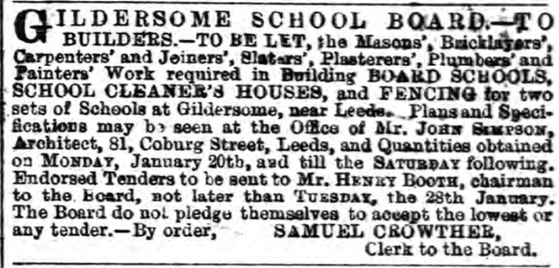
By the end of 1873, plans made in the previous year began to take form. A county wide audit of all School Boards was ordered for December of 1872 and on the 12th, it was Gildersome's turn. It appears that the Board sailed through the audit since a notice appeared in the Bradford Observer (left) on the 16th of January 1873³ calling for tradesman of all types to view plans and specifications for two new schools (above). And a month later, an advertisement appeared in the Leeds Intelligencer to hire a certified Head Teacher at a salary of £75 per annum.⁶ The salaries for other staff were set as follows, assistant mistresses at £40 per annum and for teachers £25. In March, the Board instructed the clerk, Samuel Crowther, to, 'forward the plans to the Education Department for approval, and to apply for the necessary powers to borrow from the Public Works Loan Commissioners the sum of £6250, being £3600 in respect of the (Street) Lane School and £2650 in respect of the Gelderd Road School.' ⁷ In due course, the plans and loans were approved and ground was broken at both sites that summer. There was a ceremony in August in honor of the laying the foundation stones and brass plaques were affixed to the stones to commemorate the event and the School Board. (see the photo at the top of the page)
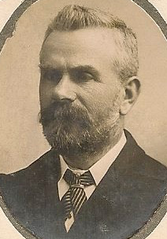 Samuel Crowther, Board Clerk
Samuel Crowther, Board Clerk
The Moor Head school was operational first, with one Miss Brocklehirst as head mistress. All parents were ordered to send their children there so the space must have been quite large. It was found that, soon after the start of new classes, the "Religious Difficulty" could not be ignored. From the Leeds Intelligencer on May 30 1873, 'A letter was read from Miss Brocklehirst, the head mistress of Moor Head School, asking what religious instruction the board wished to be given. Hitherto she had opened the school with singing and prayer, and a hymn and a chapter from the Bible. Much time was occupied (by the board) in considering this point - The "religious difficulty" - and in framing bye-laws which had been drawn up by the Rev. J. Haslam and the Rev. C. H. Gibson. .... (ultimately) a resolution was passed to the following effect: "That the instruction given in the Gildersome Board schools shall be secular, and that the school shall be opened daily by the singing of a hymn from a selection approved by the board and the devout reading of the Holy Scriptures" - Mr Gibson objected to the motion because the Lord's Prayer was excluded from the resolution, and voted against it, The other members were in favour of the resolution in the form in which it was passed.' ³ With this new alteration to the byelaws, it would seem that the dream of a "nonsectarian education" had faded away (at least for a while)!
Attempting to correct some of the inequities in the Education Bill, in August of 1874, the new Endowed Schools Act Ammendment Bill affirmed that, 'no scheme can be satisfactory which does not admit the children of Dissenters to Grammer Schools upon equal terms with the children of Episcopalians' ⁸
The following three newspaper articles provide some insight into the Board during the period just prior to the opening of the new schools. Please read in numerical order (click on each article to expand): ³
Attempting to correct some of the inequities in the Education Bill, in August of 1874, the new Endowed Schools Act Ammendment Bill affirmed that, 'no scheme can be satisfactory which does not admit the children of Dissenters to Grammer Schools upon equal terms with the children of Episcopalians' ⁸
The following three newspaper articles provide some insight into the Board during the period just prior to the opening of the new schools. Please read in numerical order (click on each article to expand): ³
On the first of February 1875, the Street Lane School and the Gelderd Rd. School officially opened. Notices were sent to parents that the "compulsory clauses of the Act" would now be enforced. In roughly four years, the Gildersome School Board had successfully built two new schools and fully carried out the required provisions of the Education Act. Before the opening of the Street Lane School, "addresses were delivered, suitable to the occasion by the Vicar of Gildersome (the Rev. C. H. Gibson), the Chairman of the School Board, and other members." It's not know at the present time whether the Moor Head School was abandoned at that time or not. ⁹
Three years later, the third School Board election took place, the following Leeds Mercury piece sums it up fairly well: ³
Three years later, the third School Board election took place, the following Leeds Mercury piece sums it up fairly well: ³
The Elementary Education Act of 1880 made education compulsory for all children. School boards were abolished by the Education Act 1902, which replaced them with local education authorities.
In his History of Gildersome circa 1914, Philip Henry Booth, writing about Gildersome's schools at that time, said that: "Education is conducted by a District Sub-Committee, under the control of the West Riding Education Committee and the three elementary schools in the area are efficiently taught by able Head Masters and teachers. Evening classes in science and art have been very successful, but owing to the war they have been temporarily suspended. Higher education is provided for at Morley Secondary School, for which Gildersome is rated; at Batley Grammar School in which there are certain rights owing to Gildersome having been part of the ancient parish of Batley; and students are sent to Leeds University. A scholar in one of the elementary schools (Street Lane School) won a scholarship at Batley, a scholarship tenable at Oxford, and he is now a Professor of the Leeds University. I refer to Professor Charles Crowther, M.A., Corpus Christi College, Oxford, Ph.D.Leipzig, the son of Mr. Samuel Crowther, Hart Hill House, Gildersome."
(Charles Crowther was the son of Samuel Crowther, School Board Clerk)
In his History of Gildersome circa 1914, Philip Henry Booth, writing about Gildersome's schools at that time, said that: "Education is conducted by a District Sub-Committee, under the control of the West Riding Education Committee and the three elementary schools in the area are efficiently taught by able Head Masters and teachers. Evening classes in science and art have been very successful, but owing to the war they have been temporarily suspended. Higher education is provided for at Morley Secondary School, for which Gildersome is rated; at Batley Grammar School in which there are certain rights owing to Gildersome having been part of the ancient parish of Batley; and students are sent to Leeds University. A scholar in one of the elementary schools (Street Lane School) won a scholarship at Batley, a scholarship tenable at Oxford, and he is now a Professor of the Leeds University. I refer to Professor Charles Crowther, M.A., Corpus Christi College, Oxford, Ph.D.Leipzig, the son of Mr. Samuel Crowther, Hart Hill House, Gildersome."
(Charles Crowther was the son of Samuel Crowther, School Board Clerk)
|
The First School Board 1871
Rev. C. H. Gibson Rev J. Haslam George Webster Henry Booth John Moore Samuel Crowther, clerk |
The Second School Board 1874
George T. Bedford John Moore Thomas Ogden Rev. C. H. Gibson Rev. John Haslem Samuel Crowther, clerk |
The Third School Board 1878
Henry Holiday C. J. Webster W. Dixon C. Clayton James Ellis ????????, clerk |
List of some people and firms, not mentioned above, who were involved in the creation of the Gildersome Schools.
Mr. William Ellis, Auditor
Mr. J. W. Oxley, treasurer to the Board.
Miss M. Paterson, of Glasgow, was the 2nd headmistress at Moorhead, salary £90 per annum.
Messers Simpson & Burrell, solicitors to the Board.
Mr. John Holliday, owned the land upon which the Street Lane School was purchased.
Mr Alfred Bilbrough owned the land upon which the Gelderd Rd School was purchased.
Mr. Matthew Wilson, contractor, masons and bricklayers at Street Lane School.
Messers J & T Holdsworth, contractor, masons and bricklayers at Gelderd Rd School.
Mr. William Ellis, Auditor
Mr. J. W. Oxley, treasurer to the Board.
Miss M. Paterson, of Glasgow, was the 2nd headmistress at Moorhead, salary £90 per annum.
Messers Simpson & Burrell, solicitors to the Board.
Mr. John Holliday, owned the land upon which the Street Lane School was purchased.
Mr Alfred Bilbrough owned the land upon which the Gelderd Rd School was purchased.
Mr. Matthew Wilson, contractor, masons and bricklayers at Street Lane School.
Messers J & T Holdsworth, contractor, masons and bricklayers at Gelderd Rd School.
Sources:
1] Wikipedia
2] Leeds Mercury, 25 Feb 1871
3] All Images and all newspaper excerpts from:
Image © THE BRITISH LIBRARY BOARD. ALL RIGHTS RESERVED
British Newspaper Archive (www.britishnewspaperarchive.co.uk)
4] Bradford Daily Telegraph 31 Mar 1871
5] Report: The Committee of Council on Education (England and Wales) 1873-74, Byelaws of School
Boards, Pages 159-160
6] Leeds Intelligencer 15 Feb 1873
7] Bradford Observer 26 Feb 1873
8] Dewsbury Reporter 01 Aug 1874
9] Dewsbury Reporter 06 Feb 1875
10] Photo © Betty Longbottom (cc-by-sa/2.0 geograph.org.uk
11] Photo © Charles Soderlund
1] Wikipedia
2] Leeds Mercury, 25 Feb 1871
3] All Images and all newspaper excerpts from:
Image © THE BRITISH LIBRARY BOARD. ALL RIGHTS RESERVED
British Newspaper Archive (www.britishnewspaperarchive.co.uk)
4] Bradford Daily Telegraph 31 Mar 1871
5] Report: The Committee of Council on Education (England and Wales) 1873-74, Byelaws of School
Boards, Pages 159-160
6] Leeds Intelligencer 15 Feb 1873
7] Bradford Observer 26 Feb 1873
8] Dewsbury Reporter 01 Aug 1874
9] Dewsbury Reporter 06 Feb 1875
10] Photo © Betty Longbottom (cc-by-sa/2.0 geograph.org.uk
11] Photo © Charles Soderlund


